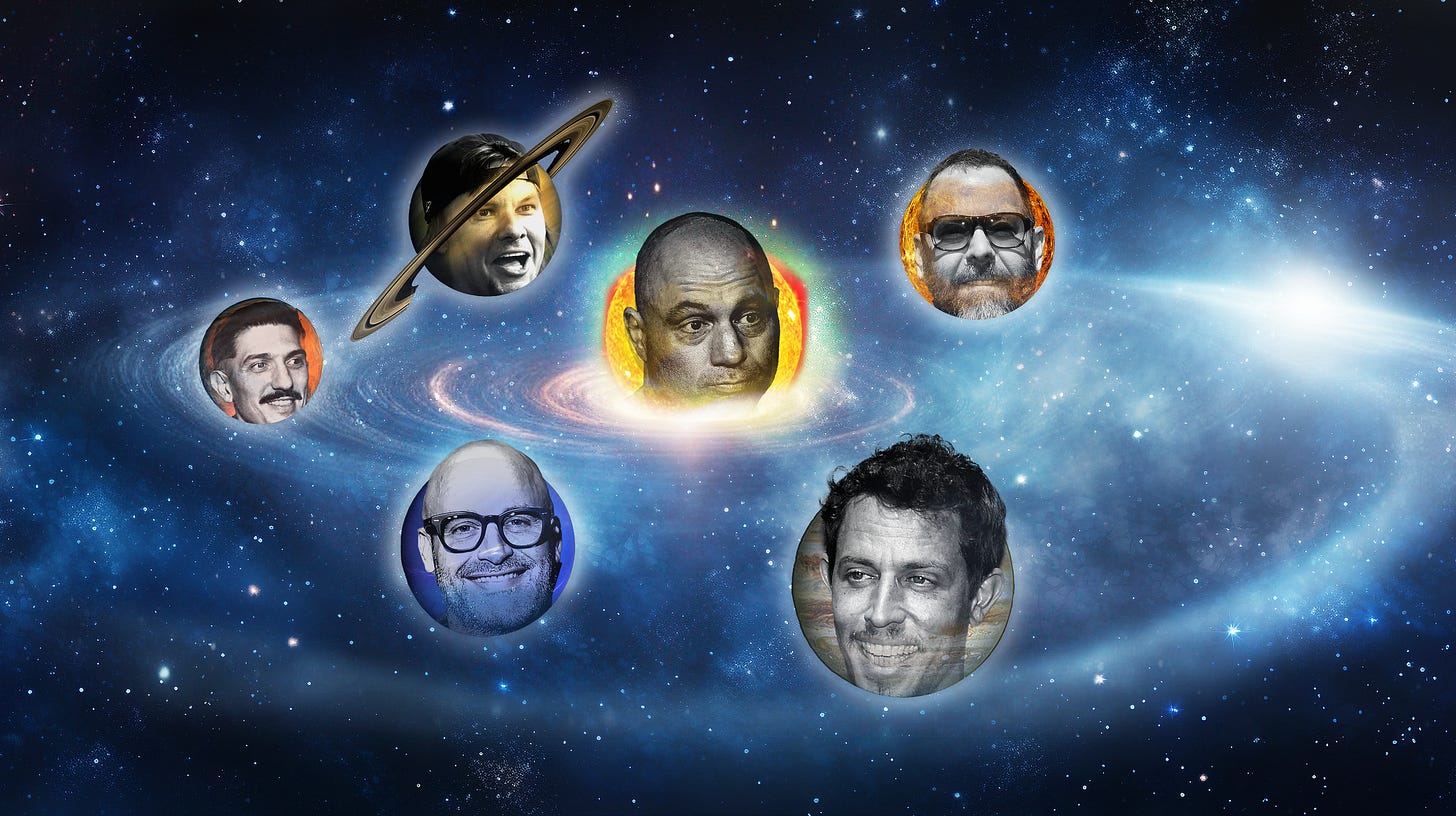Rogan's Heroes: The 'Manosphere' Comics Making Millions — With Hollywood's Help
Tony Hinchcliffe, Theo Von and more score eight-figure fortunes as comedy gatekeepers lose power in a new Trump-era culture of the uncancelable

Lachlan Cartwright writes about media. He previously broke news of Rachel Maddow’s pay cut at MSNBC, CNN’s star-salary “beheadings” and the paltry Amazon election night payday for Brian Williams.
This Ankler feature is a 10-minute read.
On the evening of Tuesday, Nov. 19, just two weeks after Donald Trump had been elected president for the second time, comedian Tony Hinchcliffe took the stage at Comedy Mothership, an Austin club owned by Joe Rogan.
Wearing a black skull- and rose-embroidered Western shirt over a black mock turtleneck and black jeans with a red-buckled belt, Hinchcliffe clapped and blew kisses to the audience.
The 40-year-old had attracted international headlines in October after his performance at a Trump rally at Madison Square Garden. Video from the event went viral over a joke he made about Puerto Rico being “a floating island of garbage.”
“It’s fucking wild. I was the news for nine and a half days during a fucking huge election,” Hinchcliffe told the cheering Austin audience during the set, which he released on Elon Musk’s X with the title Garbage (others have since posted it on YouTube).
In the wake of the MSG rally, some people had thought Hinchliffe’s career was over. Turns out, it was just about to go supernova.
In fact, the day Hinchcliffe made the Puerto Rico joke, he gained more than 36,000 new followers on X and 23,763 more on Instagram, according to Social Blade.
“It didn’t make any sense,” he said at the Mothership. “It was never my intention to swing an election, but goddammit — right place, right time, I guess.”
Hinchcliffe is just one of several comedians who’ve made the most of being in the right place — namely, on Rogan’s top-charting podcast, The Joe Rogan Experience — at the right time: the age of alt-right comedy ascendance, fueled by a mix of cultural, political and economic factors that also swept Trump back into the White House.
“Joe has completely changed the game,” Gotham Comedy Club co-owner Chris Mazzilli tells me. “He is the king . . . His numbers now are through the roof. If you get on Rogan, that’s a huge deal. For a lot of comics that’s the goal.”
Rogan’s crew — along with Hinchcliffe, the group includes Theo Von, Andrew Schulz, Tom Segura, Bert Kreischer, with plenty of new voices in the wings — are laughing all the way to the bank. They’re raking in millions, and they’re doing it with entrepreneurial savvy (books, podcasts, self-released specials) that allows them to leapfrog the traditional path to comedy fame and fortune.
These guys (and yes, they are all guys) aren’t waiting for traditional Hollywood gatekeepers to anoint them with a sitcom or movie role (or to protest their appearance in such), though you’ll occasionally catch one of their specials on Netflix. After almost a decade of comedians complaining about “cancel culture” and fretting over it incessantly, the idea of cancellation here is about as foreign as the “illegals” they worry about coming over the border. With Garbage, Hinchcliffe doubled down on his Puerto Rico joke and dwelled on the c-word. No limits.
From my reporting on this burgeoning group of comics, their audiences and income streams, you’ll learn:
How the Rogan machine operates to churn out provocative new voices
How much Hinchcliffe and Von will make this year
Which Hollywood agents at WME, CAA and UTA are repping these voices despite controversies
What makes alt-right comics non-cancelable
How much comics are earning by skipping the Hollywood line to build their own businesses and brands
How Hinchcliffe is building his own stable of voices in an echo of his rise via Rogan
How Netflix’s drive into comedy enriched comics inside and outside the ecosystem
The Netflix exec who remains the wider comedy world’s most significant gatekeeper



